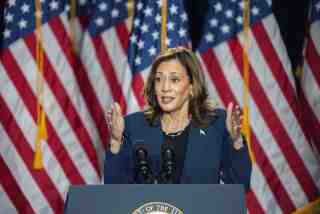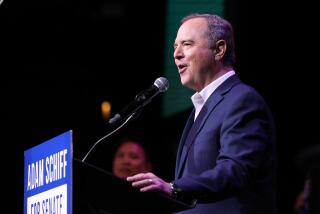Without Buchanan, Forbes Aims to Be GOP’s Mr. Right
- Share via
COLUMBIA, S.C. — When Patrick J. Buchanan quit the Republican presidential race Monday, Steve Forbes moved one step closer to uniting the Republican right against George W. Bush--the cornerstone of his uphill bid to seize the GOP nomination.
For months, Forbes has tried to rally the right by arguing he is the one conservative with a chance to stop Bush, the acknowledged front-runner. Now, with the Republican field dwindling, Forbes suddenly is looking at a window of opportunity that could decide whether he will emerge as a serious factor in the contest--or remain a well-funded curiosity.
Of the five Republicans still chasing Bush, the self-financed Forbes has the most straightforward plan: Challenge Bush everywhere, and everywhere try to portray himself as the conservative alternative. Indeed, Forbes has dramatically escalated his spending in recent months and has built a nationwide campaign organization exceeded only by Bush.
But now Forbes faces a fateful decision on how aggressively to make his case against the Texas governor. Forbes has repeatedly hinted he will soon air television advertisements contrasting his views on issues such as taxes and government spending with Bush’s views. If Forbes does target Bush with his advertising, he could damage the front-runner and reignite resentment among GOP voters about Forbes’ kamikaze television attacks against the eventual 1996 nominee, Bob Dole.
“I don’t know whether the Forbes campaign understands that the baggage they had from four years ago is tremendous,” said Dick Bennett, an independent pollster in New Hampshire. “People remember the intensity of his negative campaign and respond against it.”
Bush advisors say they have stockpiled response ads--and insist that the first victim of a television blitzkrieg would be Forbes himself. “His best moments have been when he’s representing interesting ideas, not when he’s been out there with a blowtorch,” said one senior Bush aide. “Unless he wants complete pariah status in the party . . . he shouldn’t attack.”
Forbes’ camp says it has made no final decision on his advertising strategy. Yet the real question appears to be not whether but when he will target Bush. “I can assure you our ads . . . will force [Bush] to answer where he stands on specifics,” says Bill Dal Col, Forbes’ campaign manager.
Forbes already is drawing sharper contrasts with Bush on the campaign trail. Systematically, he has maneuvered at least slightly to Bush’s right on almost every major issue. While Bush, for instance, has said he would convert federal Title I funds into private school vouchers for parents at public schools that have performed poorly for three years or more, Forbes has called for immediately using the entire $8-billion program to fund vouchers.
On foreign policy, Forbes opposed the use of U.S. ground troops in Kosovo last spring and is against the entry of China into the World Trade Organization--both of which Bush has backed. Although Bush hasn’t released detailed plans on taxes or Social Security, Forbes says the governor’s proposals are unlikely to be as bold as his calls for a 17% flat tax and a massive privatization of the nation’s public retirement plan.
Even on social issues, Forbes is tilting to Bush’s right. Each man says he opposes legalized abortion, and the two agree that it makes little sense to push for a ban unless and until public opinion changes. But Forbes insists he would be more aggressive in trying to shift the climate against abortion; he’s pledged to appoint only judges who oppose legalized abortion, something Bush has refused to do.
Along with differentiating his message, Forbes is methodically building a stronger campaign organization than during his 1996 run. In the first nine months of this year, he opened his checkbook to spend $20.7 million--slightly more than the $20.3 million Bush has spent.
Forbes’ spending has included nearly $5.5 million in television ads already, according to an analysis for The Times by the Virginia-based Campaign Study Group. But, strikingly, he also has opened well-staffed offices in a dozen states, including every state that will vote in January and February in the first stages of the Republican contest. And to strengthen his ties to social conservatives, Forbes has hired more than half a dozen leading organizers from groups such as the Christian Coalition.
These efforts to tend the grass roots are paying off. In Iowa, where Forbes finished a weak fourth in 1996, polls now put him a solid second to Bush. In South Carolina--another critical early primary state where Forbes ran poorly in 1996--he turned some heads among local observers with a statewide list of supporters he released last week. Included in the group are several county chairmen of the Christian Coalition, the statewide director of television evangelist Pat Robertson’s 1988 presidential campaign and the chairman of Buchanan’s 1992 and 1996 campaigns in the state.
Forbes assembled that list after months of careful wooing that included private meetings with small groups of Southern Baptist pastors who grilled him on social issues. “When you get down here, we are Christians first and Republicans second,” says Dee Workman Benedict, a Christian Coalition board member who’s gone to work for Forbes in South Carolina. “He is able to talk about those [social] issues now in a language [his listeners] understand, and he wasn’t able to do that four years ago.”
Yet for all the signs of progress, Forbes still faces several hurdles to becoming a true threat to Bush. One is the continued presence in the race of conservative activist Gary Bauer, who’s challenging Forbes for votes on the right. Though Bauer shows minuscule support in national surveys, he’s hoping to vault past Forbes with a victory in the Louisiana caucus in January--the strategy Buchanan used four years ago to ambush his better-financed conservative rival, Sen. Phil Gramm (R-Texas).
Nor is it yet clear that Bush is too moderate for many Republicans. In New Hampshire, polls show him comfortably leading Forbes even among voters who term themselves “very conservative.”
And in recasting himself as a crusader for hard-core conservative causes, especially on social issues, Forbes appears to have diminished his appeal to more moderately conservative voters, who still dominate the GOP primary electorate in most states. “I think he’s losing as much on one end as he’s gaining on the other,” said Warren Tompkins, who’s running Bush’s campaign in South Carolina.
Many analysts believe Forbes’ greatest difficulty remains the skepticism among voters about electing a president who has never held public office.
“Most Republican primary voters, whether they be strong conservatives or not . . . want someone who has demonstrated success as a political leader--and that’s a fundamental liability for Steve Forbes,” said Whit Ayres, a GOP pollster unaffiliated in the race.
Those doubts may be most daunting for Forbes in Southern states such as South Carolina, where this New Jersey Episcopalian who starred on the chess team at Princeton University faces a potentially formidable cultural gap with rank-and-file voters. If Forbes is still viable when the GOP race arrives here in February, his fate may turn on whether Southern Republicans will vote for a candidate with Barry Goldwater’s message but Nelson Rockefeller’s pedigree.
(BEGIN TEXT OF INFOBOX / INFOGRAPHIC)
The Incredible Shrinking GOP Campaign
The presidential primary season is more compacted than ever, placing a premium on early fund-raising. With Patrick J. Buchanan leaving the GOP on Monday to seek the Reform Party nomination, six candidates have quit the Republican contest, three months before a vote is cast. Never have so many serious candidates quit so early. In effect, donors have supplanted voters in winnowing the presidential field.
*
*Smith left the GOP to run as an Independent.
**Buchanan left the GOP to run for the Reform Party’s nomination.
More to Read
Get the L.A. Times Politics newsletter
Deeply reported insights into legislation, politics and policy from Sacramento, Washington and beyond. In your inbox twice per week.
You may occasionally receive promotional content from the Los Angeles Times.










